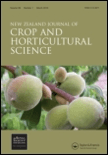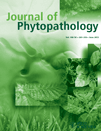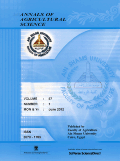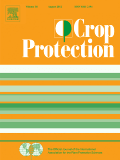
PLANT PROTECTION SCIENCE
Scope & Guideline
Exploring the science behind thriving crops and healthy soils.
Introduction
Aims and Scopes
- Integrated Pest Management (IPM):
The journal emphasizes research on integrated pest management strategies that combine biological, cultural, and chemical methods to control pests and diseases effectively while minimizing environmental impact. - Biological Control Agents:
A significant focus is on the use of biological control agents, including natural enemies and biopesticides, which are explored for their efficacy in managing pests and diseases in various crops. - Plant Pathology and Disease Resistance:
Research on plant diseases, including their etiology, epidemiology, and resistance mechanisms, is a core area, with studies aimed at improving disease resistance in crops through genetic and agronomic strategies. - Weed Science and Management:
The journal addresses weed management strategies, including the development of herbicides and alternative control methods, as well as the ecological impacts of weed control practices. - Molecular and Genomic Approaches:
Studies utilizing molecular and genomic techniques to understand plant-pathogen interactions, resistance mechanisms, and the genetic basis of traits important for plant protection are increasingly prominent. - Environmental and Sustainable Practices:
The journal promotes research that contributes to sustainable agricultural practices, focusing on reducing chemical inputs and enhancing ecosystem services.
Trending and Emerging
- Precision Agriculture Technologies:
Recent publications highlight the use of precision agriculture tools, such as unmanned aerial vehicles (UAVs) and remote sensing, for effective monitoring and management of pests and diseases. - Biopesticides and Natural Products:
There is an increasing trend towards researching biopesticides and natural products derived from plants and microorganisms, indicating a shift towards environmentally friendly pest control methods. - Molecular Tools for Disease Resistance:
The application of molecular techniques to enhance understanding of plant disease resistance mechanisms and the development of resistant varieties is gaining momentum. - Climate Change Impacts on Plant Protection:
Emerging studies are focusing on the effects of climate change on pest and disease dynamics, highlighting the need for adaptive management strategies in changing environmental conditions. - Interdisciplinary Approaches:
An increase in interdisciplinary research that combines plant protection with other fields such as ecology, genomics, and environmental science is becoming more prominent.
Declining or Waning
- Chemical Pesticide Efficacy Studies:
While still relevant, the frequency of studies solely focused on the efficacy of chemical pesticides has decreased, possibly due to a growing emphasis on integrated and sustainable approaches to pest management. - Traditional Entomological Studies:
Research centered exclusively on classical entomology, such as taxonomy and basic life cycle studies, appears to be waning, as more studies integrate ecological and molecular perspectives. - Pathogen Identification without Management Strategies:
There is a noticeable reduction in papers that solely focus on the identification of plant pathogens without linking them to applicable management strategies, reflecting a shift towards applied research. - Narrow Scope on Specific Crop Diseases:
The journal has seen a decline in publications focusing on specific diseases of niche crops, as broader studies addressing multiple crops and integrated approaches gain traction.
Similar Journals

Bulgarian Journal of Agricultural Science
Bridging Theory and Practice in Agricultural SciencesThe Bulgarian Journal of Agricultural Science, with ISSN 1310-0351, is a distinguished scholarly publication dedicated to advancing the field of agricultural and biological sciences. Published by the Scientific Issues National Centre Agrarian Sciences in Bulgaria, this journal serves as a vital platform for researchers, professionals, and students to disseminate significant findings and innovative approaches within the agricultural sector. The journal operates under an Open Access model and has consistently published research from 2008 to 2024, ensuring timely dissemination of knowledge. With a current impact factor that places it in the Q3 quartile in both Agricultural and Biological Sciences and Veterinary categories, it reflects a commitment to quality and relevance in research. Furthermore, the journal is indexed in Scopus, showcasing its global visibility and outreach. The Bulgarian Journal of Agricultural Science is pivotal for those aiming to contribute to sustainable agricultural practices and veterinary advancements, fostering a robust dialogue among scholars and practitioners alike.

PHYTOPROTECTION
Advancing the Science of Plant ProtectionPHYTOPROTECTION is a distinguished academic journal dedicated to the field of plant protection, published by the Quebec Society for the Protection of Plants. With an ISSN of 0031-9511 and an E-ISSN of 1710-1603, it serves as a platform for researchers, professionals, and students focused on the latest advances in plant protection methodologies, pest management, and sustainable agricultural practices. Although the journal's coverage in Scopus has been discontinued since 2010, its past publications encompass a wealth of valuable research from 1993 to 1994 and from 1996 to 2010, making it a crucial resource for those investigating plant health. The journal firmly positions itself as a fundamental contribution to the advancement of agricultural science, emphasizing research that addresses both contemporary challenges and future trends in the protection of plant resources.

NEW ZEALAND JOURNAL OF CROP AND HORTICULTURAL SCIENCE
Nurturing the Future of Crop and Horticultural SciencesThe New Zealand Journal of Crop and Horticultural Science, published by Taylor & Francis Ltd, stands as a key resource in the fields of Agronomy and Horticulture, with a commendable impact factor reflecting its quality and influence in the scientific community. Since its inception in 1989, this journal has been committed to advancing our understanding of crop development and horticultural practices, catering not only to researchers and professionals but also to students eager to delve into the intricacies of plant sciences. With a Q3 ranking in both Agronomy and Crop Science and Horticulture as of 2023, the journal occupies a significant position within the agricultural and biological sciences domain, significantly contributing to the body of knowledge in these fields. The journal features original research, reviews, and technical notes that cover a wide range of topics, ensuring a comprehensive perspective on contemporary and emerging agricultural issues. For individuals interested in accessing cutting-edge research, the journal provides subscription-based access, further enhancing its scholarly contributions.

PHILIPPINE AGRICULTURAL SCIENTIST
Cultivating Knowledge, Nurturing Innovation.PHILIPPINE AGRICULTURAL SCIENTIST is a pioneering journal published by the University of the Philippines Los Baños, dedicated to advancing the fields of Agronomy, Crop Science, Animal Science, and Biotechnology. With an ISSN of 0031-7454, this esteemed journal provides a vital platform for researchers and practitioners focusing on agricultural innovations and practices in the Philippines and beyond. With a robust history dating back to 1996 and continuing through 2024, the journal operates within the Q4 quartile, reflecting its potential for growth and impactful contributions in its categories. Despite currently being positioned in the lower ranks, it serves as an essential publishing venue for nascent studies and localized research, contributing to the agricultural discourse. The journal fosters a collaborative research environment, encouraging submissions from both emerging scholars and seasoned experts, making it a valuable resource for students, professionals, and researchers engaged in the agricultural sciences. While it currently does not offer open access, it plays a crucial role in disseminating vital knowledge aimed at enhancing agricultural practices in the region.

CANADIAN JOURNAL OF PLANT SCIENCE
Nurturing Scientific Growth in Plant SciencesCanadian Journal of Plant Science (ISSN: 0008-4220, E-ISSN: 1918-1833) is a prestigious publication dedicated to advancing research in the fields of agronomy, horticulture, and plant science. Published by Canadian Science Publishing, this journal has been a cornerstone in the Canadian and international scientific community since its inception in 1973. With a solid presence in reputable databases, it ranks in the Q3 category for multiple disciplines as of 2023, reflecting its impact and relevance within the agricultural sciences. The journal serves as a vital resource for researchers, professionals, and students, encouraging the dissemination of innovative findings and fostering collaboration across disciplines. Although it is not an open-access journal, subscribers gain exclusive access to a wealth of knowledge, with articles aiming to enhance the understanding of plant systems and contribute to sustainable agricultural practices. The Canadian Journal of Plant Science remains committed to supporting the growth of plant-related research and its practical applications in today's changing environmental landscape.

JOURNAL OF PHYTOPATHOLOGY
Exploring the intricate dance between plants and pathogens.JOURNAL OF PHYTOPATHOLOGY, published by Wiley, stands as a premier platform for disseminating cutting-edge research in the field of plant health, emphasizing the interactions between plants and pathogens. Since its inception in 1958, the journal has fostered a rich legacy of advancing scientific knowledge and understanding in areas encompassing Agronomy, Crop Science, Genetics, and Plant Physiology. With its notable impact factor and respectable positions in respective Scopus ranks, including Q2 in Agronomy and Crop Science, JOURNAL OF PHYTOPATHOLOGY is essential for researchers, professionals, and students dedicated to understanding and overcoming plant-related challenges. Although it operates under a traditional subscription model, the journal’s contributions remain crucial for anyone involved in plant science and pathology, making it an invaluable resource for enhancing agricultural productivity and sustainability. The journal’s commitment to excellence continues to inspire innovative research and informative discussions among the global scientific community.

Bioagro
Pioneering research that cultivates knowledge and sustainability.Bioagro is an esteemed academic journal dedicated to advancing research in the field of Agricultural and Biological Sciences. Published by the University Centroccidental Lisandro Alvarado in Venezuela, this journal has made significant strides since its inception in 2008, with a focus on delivering high-quality research publications that address contemporary challenges in agriculture and biology. Recognized for its contributions, it holds a Q3 ranking in the Agricultural and Biological Sciences (miscellaneous) category as of 2023, and it ranks #125 out of 221 in its field, placing it in the 43rd percentile. Although it operates on an Open Access model, Bioagro strives to provide broad access to innovative research, thereby fostering collaboration and knowledge dissemination among researchers, professionals, and students. With a commitment to include a wide range of topics, the journal aims to be a pivotal platform for exploration and dialogue in agricultural sciences, ensuring that key findings reach both scientific and practitioner audiences. Located in Barquisimeto-Cabudare, Lara, Venezuela, Bioagro invites submissions that contribute to the global discourse on sustainable practices and innovations in agriculture.

ANNALS OF AGRICULTURAL SCIENCES
Pioneering Research in the Heart of AgricultureANNALS OF AGRICULTURAL SCIENCES, published by Elsevier, stands as a leading open access journal dedicated to the multifaceted field of agricultural sciences. Since its inception in 2011, this journal has served as a pivotal platform for the dissemination of high-quality research, covering areas such as agronomy, animal science, horticulture, food science, plant science, and soil science. With an impressive Q1 ranking across multiple disciplines and notable positions in Scopus Ranks—including #6 in Animal Science and Zoology and #3 in Horticulture—this journal is recognized globally for its significant contribution to advancing agricultural innovations. The journal caters to a diverse audience of researchers, professionals, and students, providing them with open access to cutting-edge studies that address critical issues in agricultural productivity and sustainability. Its commitment to high-impact research ensures that articles contribute meaningfully to the scientific community, fostering advancements in agricultural practices and policies.

Crop Protection
Exploring cutting-edge strategies in crop protection.Crop Protection is a leading academic journal in the field of Agronomy and Crop Science, published by Elsevier Science Ltd, and recognized for its high impact demonstrated by an impressive Q1 quartile ranking in 2023. With its ISSN 0261-2194 and E-ISSN 1873-6904, this esteemed publication has been a crucial source of research since its inception in 1982, continuing to provide valuable insights and advancements in crop protection strategies through 2024. The journal serves a diverse audience, including researchers, professionals, and students, eager to explore pioneering findings in pest management, herbicide development, and sustainable agricultural practices. While the journal does not offer open access options, its rigorous peer-review process ensures the highest quality of scholarly articles that contribute significantly to the agricultural and biological sciences, maintaining its respected position with a Scopus rank of #63 out of 406 in its category, placing it in the 84th percentile. Engaging with Crop Protection not only enriches knowledge but also promotes innovative solutions for global agricultural challenges.

BRAGANTIA
Fostering Sustainable Solutions Through ScienceBRAGANTIA, published by the Instituto Agronômico, is a distinguished open access journal that has been a vital resource since its inception in 1977. With an ISSN of 0006-8705 and E-ISSN 1678-4499, this journal is recognized for its contributions to the field of Agricultural and Biological Sciences, where it currently holds a respectable Q2 ranking as of 2023. Additionally, BRAGANTIA is indexed in various databases, supporting its impact within Materials Science (Q3 ranking). Positioned in Brazil, the journal promotes the dissemination of high-quality research, aiming to bridge the gap between academia and practical applications in agricultural innovation and sustainability. Researchers, professionals, and students looking to keep abreast of recent advancements and their implications will find BRAGANTIA to be an indispensable platform for sharing and accessing vital agricultural knowledge.